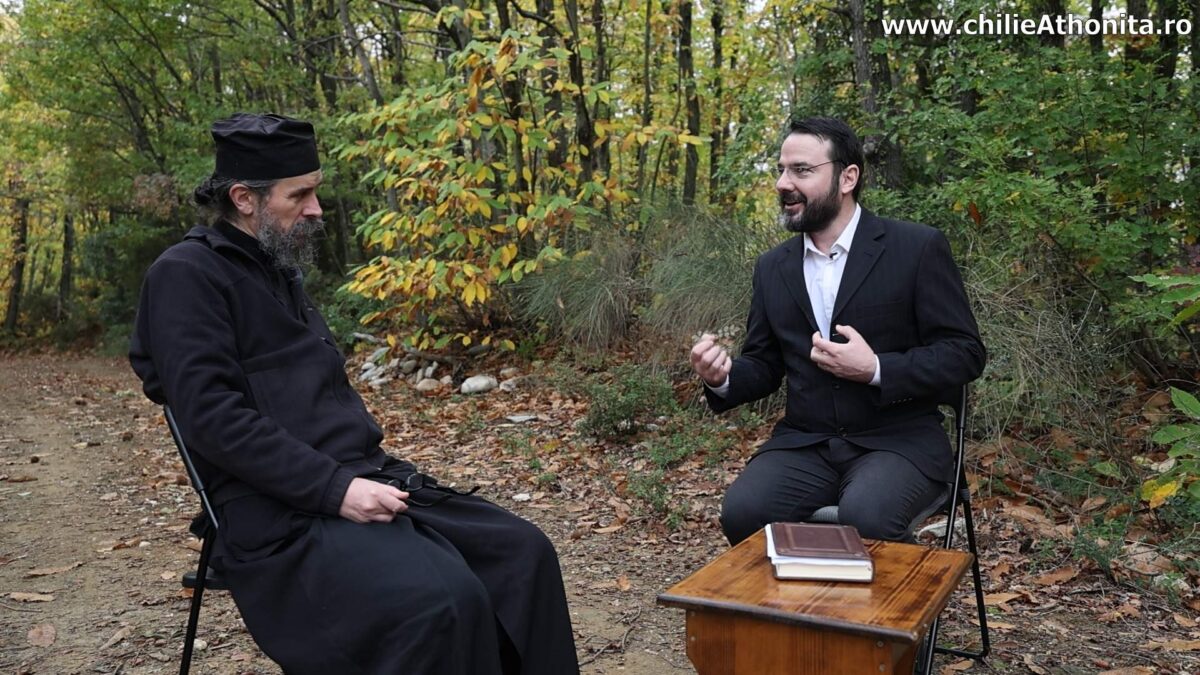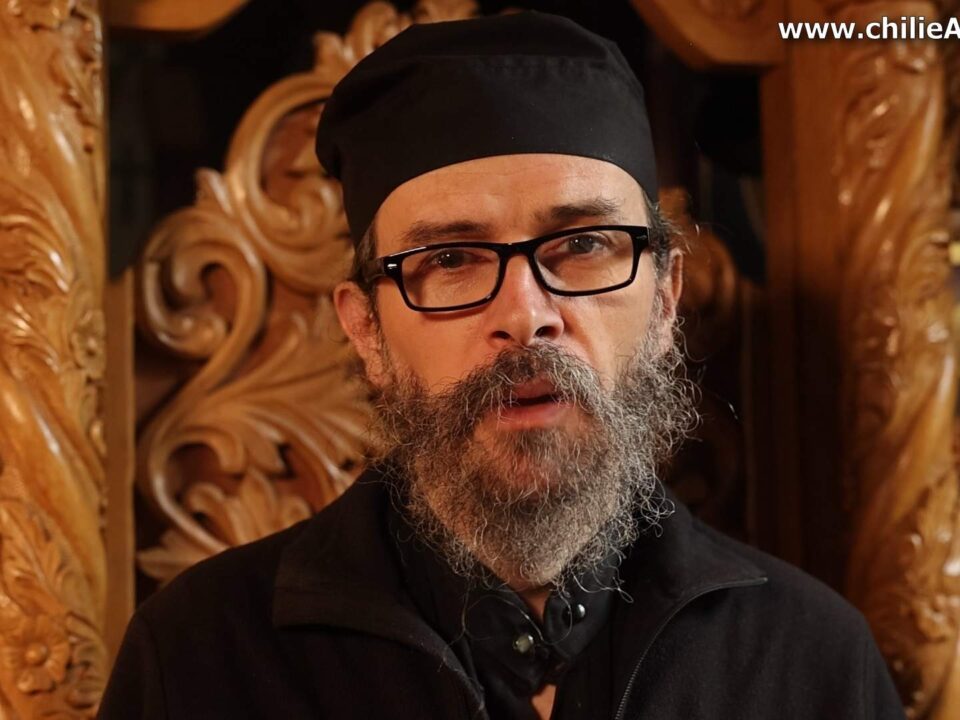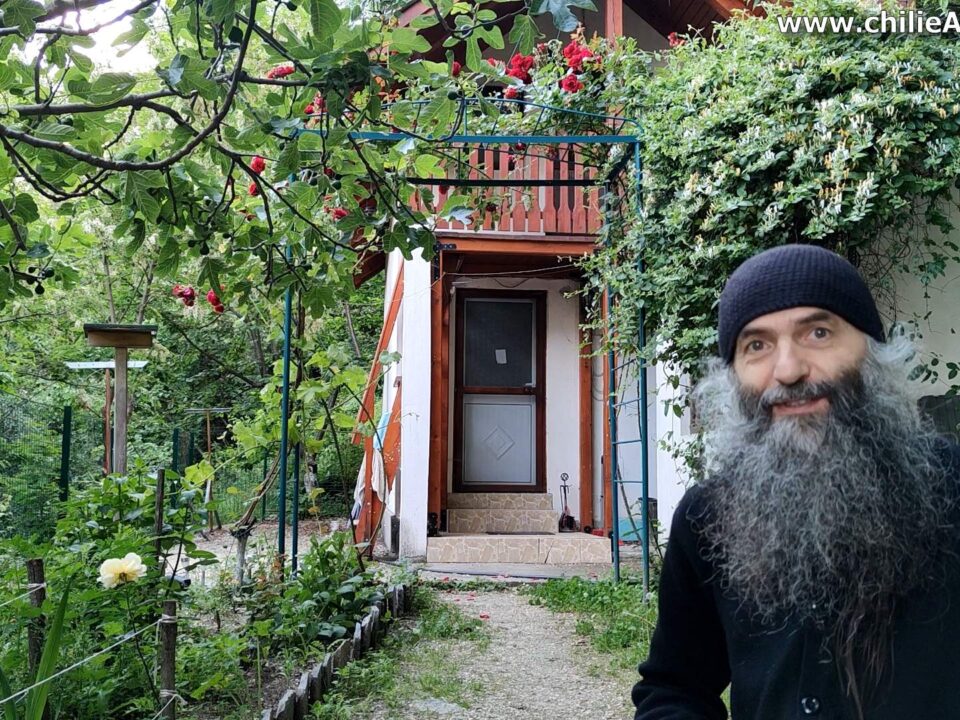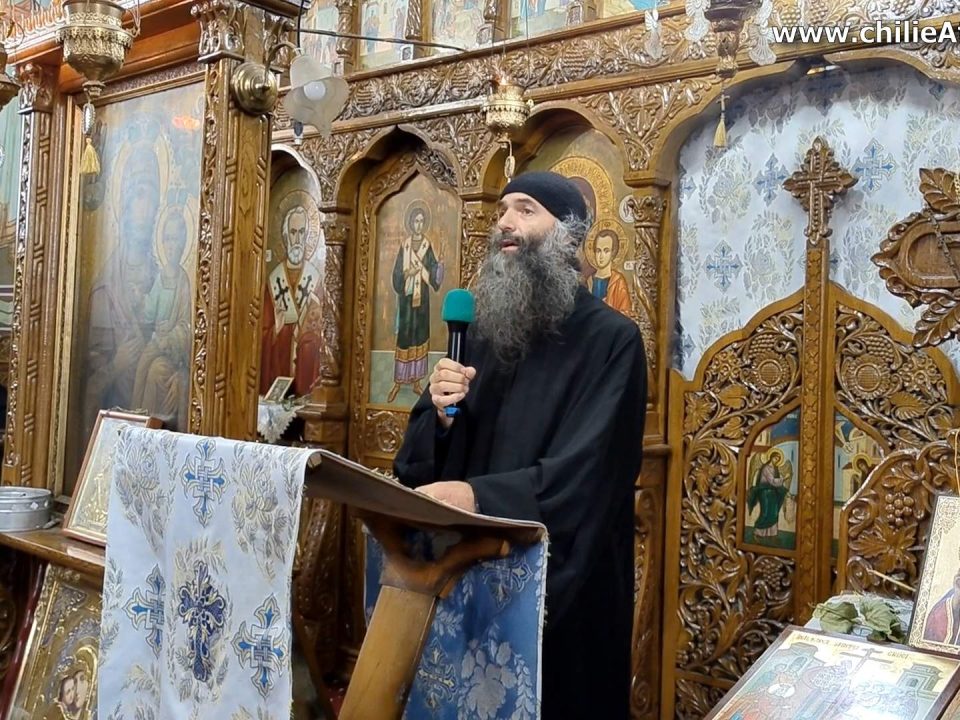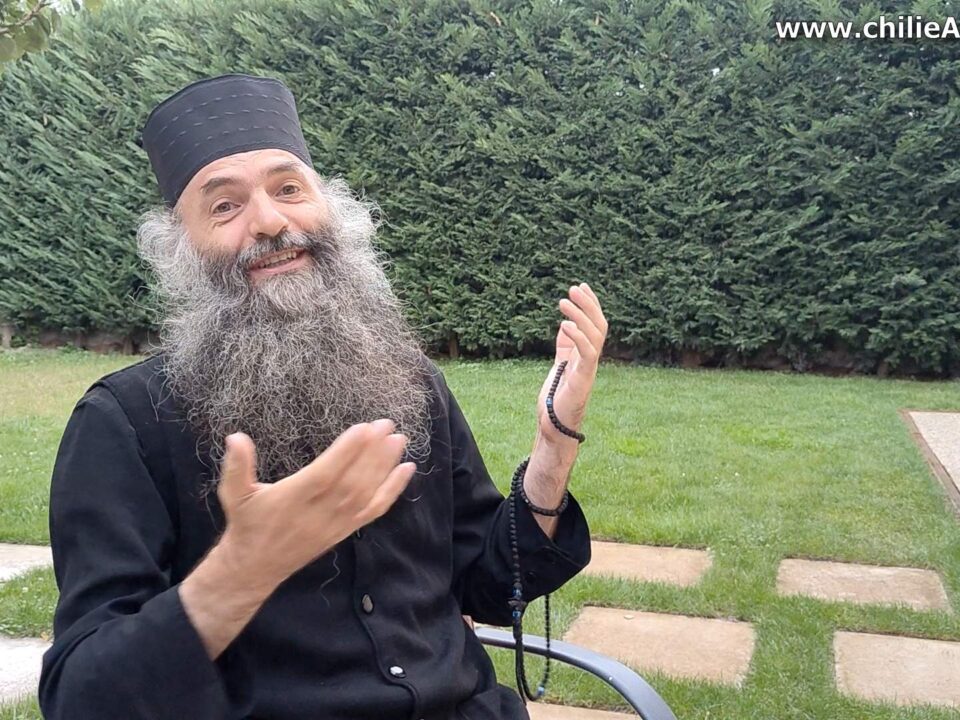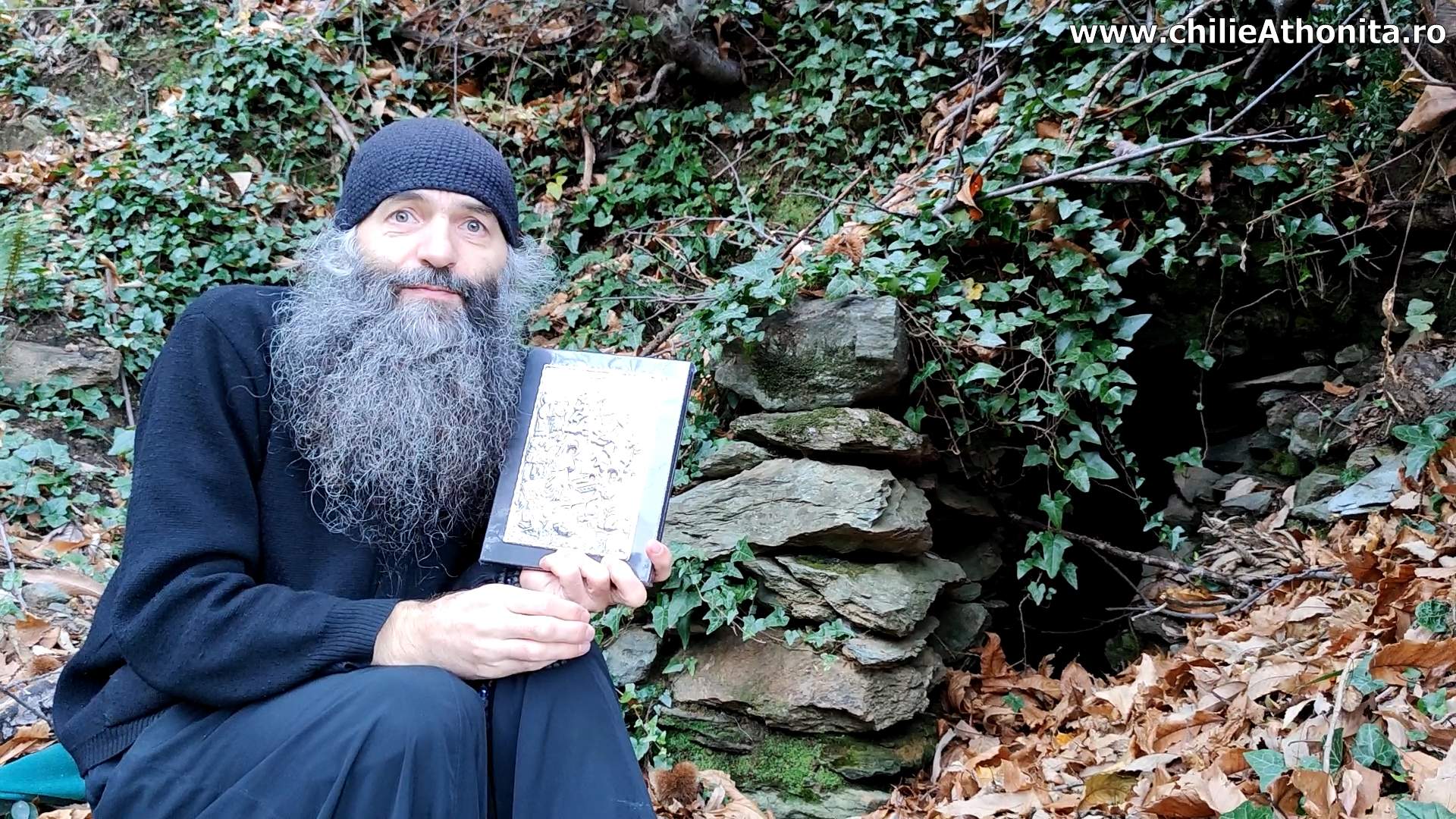
Christmas, the Mother of God and St. Stephen – Father Pimen Vlad
22 December 2022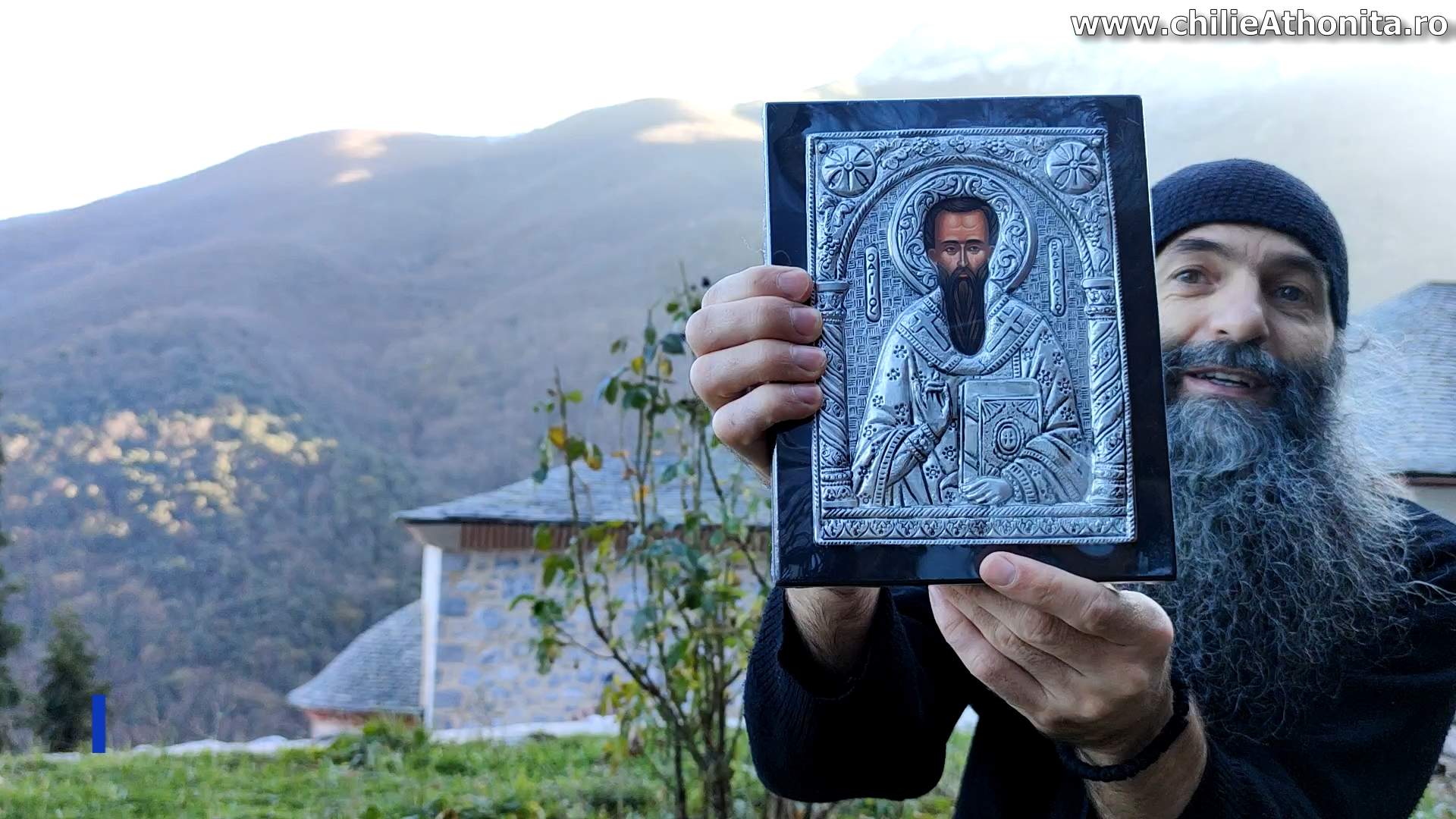
Saint Basil, the Saint From a Family of Saints – Father Pimen Vlad
29 December 2022Watch a useful discussion about one of the most important problems of the Church today: mission work. Let’s listen to what one of the most competent people in this problem has to say about this problem: Lucian Apopei, communications director of the Archdiocese of Iași, known especially for the mission work he undertakes through the Doxologia portal.
What are the challenges of mission work in the Church today?
Enjoy!
Fr. Theologos: Glory to the Father, and to the Son, and to the Holy Spirit, now and forever and unto the ages of ages. Amen. Through the prayers of our Holy Fathers, Lord Jesus Christ, Son of God, have mercy on us! Amen.
We are here with Lucian Apopei, Director of Communications at the Metropolis of Moldavia and Bukovina and I would like to discuss with him today a very thorny issue which is about communication in the Church of the 21st century. What could you tell us on this topic?
Lucian Apopei: Dear father, first of all, I can only express my astonishment at what is currently happening. Recently, not too many days ago, I didn’t even know I was going to be here on Mount Athos. Behold, I am here for the first time, and behold, I’m in front of your holiness! We glorify God for this!
Fr. Theologos: Glory to God!
Lucian Apopei: Related to the mission today, it has evolved over the years, and I believe that we must adapt, but not in the sense of taking everything that is of the world, of the worldly spirit and forgetting those of the Church, but somehow to manage to translate the rich, the beautiful things, the joy of the Resurrection into the language of the present world. We begin with the first spokesman, if you will, Moses. It is he who took the tablets from God and brought them to the people.
Fr. Theologos: True! The first communications director.
Lucian Apopei: Then we go into biblical history, with the Holy Apostles, and throughout the history of salvation there have been so many worthy people who have taken and conveyed the word of God, each according to his own ability or rather, looking at myself, inability.
Fr. Theologos: What do you think is lacking in the Church’s communication strategy today? Mainly of the Romanian Orthodox Church, so to speak.
Lucian Apopei: I would be tempted to say adaptability…
Fr. Theologos: We are talking constructively now.
Lucian Apopei: I think we must, however, be present in these environments. The handiest example, forgive me for coming up with my own example: I was present, by God’s ordinance, not by my merit, when Lumina newspaper project was consolidated at the end of 2004-2005. On February 7, the first issue appeared on the very birthday of the worthy of remembrance Father Patriarch, Theoctistus.
Fr. Theologos: May we have his prayers!
Lucian Apopei: Yes, and I know the turmoil that existed then, a need to be present also in the secular environment. Moreover, next to my name, at the Metropolis, it says: media relations, secular mass-media, which we, in the Church, must admit that we are somewhat avoiding. I don’t understand why. I am glad when there are requests because I understand that there is also a need in that sense and I rejoice from time to time, not daily, but periodically, in some episodes that truly fill your heart with joy.
Fr. Theologos: An example?
Lucian Apopei: It happened at this year’s feast of Saint Paraskeva when a journalist with great experience of many years, I think he had been coming for 20 years to the feast, year in and year out, and he knew maybe better than me how things happen, and only now he dared, somehow came shyly to ask me a question, telling me that he didn’t have the courage to ask anyone until now. It was no big deal; it didn’t seem much of a thing to me. I don’t know if I cleared it up for him, he knows, but this gesture, the desire to come and ask; I believe that people get close to Christ, to the Mother of God, because they feel that He is the One, she is the one with whom they can communicate.
Fr. Theologos: Yes and They solve their problems, They resolve their issues.
Lucian Apopei: Or us, what do we do? We are communicators, we are paid for that and we create a barrier instead of creating a communication channel. What is communication? Communication, etymologically, comes from the Latin “comunico” which means “to communicate, to transmit, to share and impart.” So we share each other’s experience. It does not mean that I, as a communicator, come and transmit something — “Watch out, that’s how it is, if you don’t agree fully, woe to you and that’s that….” It’s not really like that.
Fr. Theologos: So you mean: communication is a form of union, not of tyranny.
Lucian Apopei: It is a two-way highway. Someone could interpret and say that they are parallel, meaning, I say something and you understand something else. No. They come together.
Fr. Theologos: Yes, a form of union.
Lucian Apopei: We’re each starting from one point and we get to unite. Meaning it’s not a one-way road.
Fr. Theologos: Yes, this is very important. What impressed me a lot about what you said is that people come to ask, and I think that this question posed to the communicator, to the source, within the Church has two major, very, very important valences. One valance is the fact that — folks, inform yourselves from the source, not by what you hear and not by all sorts of things! You understand what I’m saying — from an aunt and from rumor radio.
And number two is the spiritual side of which you spoke. What could you do to get people to come to you with greater courage so that they can make of use of the information also in terms of accuracy? Because today, especially in the online environment, there is an acute lack of accurate information, and now I’m even taking a little advantage of the opportunity, please forgive me — on the internet, brethren, there are some terrible inaccuracies regarding the Holy Mountain. So inform yourself from the source! That’s one.
And two, beyond that, as you have said, it is also about the spiritual level that you, each to his extent, can offer to others. What could you do or what do you do to get people to contact you? I mean, we are talking mainly about the press, but beyond this, also those who want to inform themselves?
Lucian Apopei: My answer, I think, will surprise you, [The answer is] listening to them, father! It’s very important!
Fr. Theologos: Yes.
Lucian Apopei: It’s very important to listen to them. Especially nowadays when everyone is talking.
Fr. Theologos: Yes.
Lucian Apopei: …When everyone is talking. I remember an episode, I was in the secular press, I was active in 2004 I think, someone came looking for work, a former army colonel, you know that they retire sooner and then he was fit for work, he had been active in this field of military journalism and he felt the need to maybe get involved in the social sphere. And then, the great journalist, the one who, for that matter, contributed to shaping the Lumina newspaper project, the late Florin Zamfirescu, asked him: “Sir, what else could you write today, since everyone writes?” And we are talking about 2004, let alone now when everyone has a page on social networks, everyone has an opinion. I think that’s the solution: to listen to them!
And an example in this regard, also from this year’s feast of Venerable St. Paraskeva where there was a moment on the first day, a moment that was related to the organization of the event. There was a curve that formed in the lineup to venerate St. Paraskeva, before reaching the canopy, in the courtyard of the cathedral. It was an arrangement imposed or recommended by the gendarmerie. People did not know, they had the impression that when they arrived in the courtyard of the university they would immediately be able to venerate. At that moment they would find out about that curve, and that thus, that they still had to wait until they could venerate.
This was abandoned on the first day, but for this, the line behind the curve had to be stopped and for about an hour it didn’t move forward at all. This was not communicated, I did not know it to be communicated. I was living under the impression that the gendarmes would communicate from place to place, that the gendarmes would say, “Wait a little until a knot [in the line] is freed over there, after which you’ll arrive very quickly.” And I went on foot among the people. It is very important to listen to them, to see how dissatisfied they are…
Fr. Theologos: …what pressure they are under…
Lucian Apopei: Although we are tempted to think that each came with a good thought, with a thought of peace. They did not understand: “Why are we waiting so long and not moving forward? You are letting people cut in ahead and they are venerating at the front!” And someone even shouted, probably recognized me from TV: “You, you are the spokesperson here, what’s going on?” “Wait, let me find out!” I hadn’t quite figured out either, things just happened on the spot. “Give me your phone number! I’ll give you mine, and we’ll speak, since you’ll probably be further ahead, I won’t find you anymore, I’m going to find out and I’ll let you know!” But until then I’d listened to that lady, she expressed her sorrow, “I’m with three children, we have not advanced at all…” She had all kinds of thoughts.
Fr. Theologos: She confessed, the lady confessed in that particular matter, of course.
Lucian Apopei: I looked into it, when I called her, the lady was gone.
Fr. Theologos: Poor thing, yes…
Lucian Apopei: She had left. “No, Mr. Lucian, I was scandalized, I came 11 years in a row, I’ve never encountered this, I left.” “Madam, if you made that decision, I don’t want to convince you to come back, it’s your decision, but do you know what? Tell me your name!…” Because I hadn’t even gotten her name, so I listened to her for that long that I didn’t even know what her name was. So speaking of what we need to do — we need to listen.
Fr. Theologos: Yes.
Lucian Apopei: I said to her: “Give me your name, your children’s names or better yet, send me your commemoration list on WhatsApp!” What did she do? She stood and thought, felt some kind of openness and said, “Wait a minute, I am thinking about it, I’m at the train station now.” And I said, “Think about it, maybe you’ll come back! Where I was the last time we met, I’ll be waiting for you right there!” And the woman came back.
Fr. Theologos: Glory to God!
Lucian Apopei: And she understood. And to the people around who were also dissatisfied I explained what had happened: an organizational matter, it happens since we’re human and…
Fr. Theologos: Yes, because…
Lucian Apopei: So listening is very important.
Fr. Theologos: It is capital because it is the bond of love between us. If it closes, it all ends in smoke. And that’s why I leave the comments section open on all our websites, on all our platforms, although it would be much easier to turn off the comments, because if I leave them on, there’s this communication. I listen to people, see the feedback, and I know to pivot based on what they want. Do you understand?
This is fundamental. I know that sometimes it is very difficult when there are so many, but we always have to be open and listen, always. I know a bit about computer science and I’ve been in the field — the best programmers, or how to put it, the most experienced programmers in a company are not the ones who write code, but the ones who listen to people. Even at the big companies, I now remember at Auto Desk, there was the customer success team. So the team that ensures the success of the client and those were the best programmers out there. So those who listen, because listening is the modus vivendi of beings. This is fundamental.
Lucian Apopei: Myself, in relation to the press, you should know that a lot of information, aspects, nuances, I take from them.
Fr. Theologos: Yes, of course.
Lucian Apopei: Yes, sometimes they ask some questions that you didn’t think were possible. The diamond can also be looked at from this perspective.
Fr. Theologos: Exactly. Youth! What do we do with the youth?
Lucian Apopei: Youth. You know, maybe in this you will be surprised as well, they like to be involved.
Fr. Theologos: Bravo!
Lucian Apopei: They like to be involved. They come, of course from my own experience at Iasi, I think there were about 500 volunteers…
Fr. Theologos: Glory to God!
Lucian Apopei: …Involved in the activity of this year’s feast. We call them: the angels of the Venerable One.
Fr. Theologos: Yes, rightly.
Lucian Apopei: They can be easily recognized, they wear those red vests with the little icons on the back. Very eager, very, very eager. I mean, I for one have not encountered situations where someone complained, or said something… They have this youthful enthusiasm. If I am to identify a problem so we can talk about that side too, it is how do we bring them, how do we communicate to them the possibility of growing in that area.
Fr. Theologos: What future do they have in the Church, right?
Lucian Apopei: Yes, indeed the finality, because, of course, we are talking about a world of progress, a world of science, of technology, and here we are in the natural environment, but technology helps us. I think that even if we were to discover on this side of science the last details of the universe, to know what molecule or what atom is on planet Sirius, we still wouldn’t delve into the essence of life, what is its purpose, its meaning. That’s why we need faith, we need religion to find meaning. And young people at this age are looking for meaning.
Fr. Theologos: Of course!
Lucian Apopei: Because it’s the path they inevitably, consciously or not, feel they’re following in life, but which way, whereto? And then…
Fr. Theologos: Young people, you find your meaning in Church, not elsewhere, know that! Continue!
Lucian Apopei: Yes, we allow ourselves to be carried away by… TikTok… I was terrified. So someone sent me a clip, I don’t have a TikTok account, I don’t know if a communicator should have one.
Fr. Theologos: No, I don’t think so.
Lucian Apopei: Someone sent me a clip, I watched it and I closed the laptop. I did some more work, after about an hour or two I opened the laptop. On the internet browser I had many tabs open, the one with the TikTok also remained and at some point some swearing begins, some very nasty words. But hold on! Where from? I couldn’t find it. Good thing there was no one around because I would have sunk into the ground. But God was there, and God saw me. Where [was it] from? The engine on TikTok continued and got somewhere in an area…
Fr. Theologos: That’s how it is…
Lucian Apopei: That’s what TikTok is like?
Fr. Theologos: That’s how TikTok is. TikTok seeks to maximize pleasure, sinful pleasure. So that’s the dangerousness. The dangerousness is a very harmful back-end artificial intelligence algorithm. This is the great dangerousness of TikTok. Because they do not focus on content, you saw that there are some very short clips, but they focus on as much sinful pleasure as possible and as quickly as possible, with an ever increasing cadence. Because, you saw, clips are changing automatically. That’s the big problem, that’s the dangerousness, that’s the weapon effect of TikTok.
Lucian Apopei: And then do we go with the pearls of the Church to this area as well? A question to which I don’t know…
Fr. Theologos: People are there. People are present there and then, whether I want to or not, I have to post, because what happens? This artificial intelligence algorithm, if man guides himself, chooses his posts, in order to keep him a slave there, it delivers to him the things of the Church. So Fr. Pimen, for instance, has a lot of views on TikTok, but we don’t put them, people do. And we saw this was happening and now we have a TikTok account too, but I said to Razvan, the boy who posts on TikTok: “You’re not going to watch, meaning you post and you’re off!” I do the same on Facebook and the others. I have a Facebook account, may people forgive me because if you write some comments there, I don’t… because it’s harmful, it’s a harmful environment.
Lucian Apopei: And it’s an environment, it’s an endless…
Fr. Theologos: Endless, evidently.
Lucian Apopei: Because I don’t know of anyone who has reached the end of the internet. I don’t think so, unless you run out of signal.
Fr. Theologos: Exactly, and if you all get off TikTok, brethren, write us in the comments because we will close the account — the very next day we will closed it.
Lucian Apopei: Yes, this is also a trap, I don’t know how much the internet unites us or how much it actually connects us. I found a very interesting children’s book. So a children’s book [called] “15 Days Without Internet.”
Fr. Theologos: Glory to God!
Lucian Apopei: A story there — a family, well, the parents have decided to go on a holiday with no devices, no phone, no tablet and all that. The book is also hilarious and of course it did not sit well with the children.
Fr. Theologos: They go into withdrawal, yes…
Lucian Apopei: Exactly, they went Internet hunting, but they discovered real life, even if in that camp, the older boy — there’s an episode there — didn’t know how to approach a girl. He said, “If we had the Internet…”
Fr. Theologos: Yes, a text message…
Lucian Apopei: “What should I do, should I touch her, should I hug her?” He really didn’t know how to behave. But the moral of the book — what was actually happening? While the children were playing in that camp, the parents would go to the store, not to stock up, but because they had an Internet connection there.
Fr. Theologos: God forbid!
Lucian Apopei: The children finally figured it out and it was left for each of us to draw our own conclusions…
Fr. Theologos: That’s a book, but I know real cases where parents would start off by punishing their children by turning off the internet, and then they saw the kids were much better off without it, meaning they were rediscovering people, real life, they were maturing and so on. And suddenly they realized, “Well, hold on, because this punishment is not a punishment, it’s actually a reward,” and it’s much better because the internet does some things, God forbid! God forbid! Do you want to say something? Say it!
Lucian Apopei: Yes, I have also worked in the written press, in print media. For quite a good while, for 12 years, I was responsible for the activity of Albina printing house, a rotating newspaper printing house.
Fr. Theologos: Glory to God!
Lucian Apopei: Very interesting. Many, if not all, would be tempted to say that a newspaper is something outdated, it is something that’s limited, therefore the Internet offers you much more, but I think that the newspaper has this minus as an advantage. I mean, it has an end, the newspaper ends, it’s from here to here, there’s a cost involved and it is not small, to print, to look for paper, ink, to distribute, all this printing chain that is quite expensive, but which also holds you accountable. Meaning, you don’t come up with all kinds of…
Fr. Theologos: dregs…
Lucian Apopei: …because it’s free. And you have this sense of [appropriate] quantity. Well, we no longer have it today.
Fr. Theologos: Yes, talk a little about the sense of responsibility in the news!
Lucian Apopei: Well, I was just saying: it doesn’t hurt you, it doesn’t cost you. Of course, it may cost you even on the Internet because you lose your audience if today you come up with one whopper, tomorrow with another one, people could catch on at some point and get fed up. But you see there’s this tendency to come up with frivolous things.
Fr. Theologos: Yes, and as fast as possible.
Lucian Apopei: …As fast as possible, which stimulate your pleasure, and gives you so much serotonin that it also triggers your dopamine which gives you that addiction that is very hard to get rid of. And I am not referring to others, I mean myself too. Because there’s this temptation, I set up a counter on my phone to see how much time I’m spending. I crossed myself.
Fr. Theologos: Yes, of course.
Lucian Apopei: How is that possible? I didn’t think it was possible to spend that much time.
Fr. Theologos: TikTok is a dopamine-producing machine, that’s what it is, and now all of them are following suit, following this platform.
Lucian Apopei: And that’s because it stimulates through image.
Fr. Theologos: Yes, of course.
Lucian Apopei: And again there’s a trap here: we say that a image is worth 1000 words, but I don’t know if we can digest that way, eating only enhancing or satiety pills.
Fr. Theologos: Or drugs, because it’s actually a form of drug.
Lucian Apopei: Or drug, yes. Through the superficiality of the image — whether we are talking about photography, about video — it creates a kind of linear thinking. We lose the ability to think deeply, of thinking in 3D, 7D, 8D thinking…
Fr. Theologos: Of thinking deeply!…
Lucian Apopei: Exactly, I was very surprised, an academic gentleman told me that he gave up writing on the computer precisely due to this idea. And I can mention some great book titles that he wrote entirely on paper.
Fr. Theologos: Glory to God!
Lucian Apopei: But with a very branched theme. I mean, I couldn’t figure out how he did it, how he managed to write that book with so many points, subpoints, returns, on paper.
Fr. Theologos: Glory to God!
Lucian Apopei: Given that today we write in Word, in a writing software. We cut, erase, return, but we do not realize that we are no longer looking at things in depth, but linearly, because we can come back and it’s on a road where we can turn around like a mouse that is running, but he does not advance. And somehow we atrophy this sense of nuanced vision, which is rare.
Fr. Theologos: Yes, and it’s very important because that’s what I think should push society forward. Speaking of which, how do you see the future?
Lucian Apopei: Oh, Lord!
Fr. Theologos: The tough question…
Lucian Apopei: How does it go? “Have mercy on us, O Lord, for laying aside all excuse, we sinners offer to Thee, as to our Master, this supplication.” We hope to have God in our lives. It would be good to ask ourselves this question daily: how does God feel in our lives?
The future?… I think that in this abyss of superficiality, I hope that we won’t get informational diabetes, from so much over-informing, to become sugar-coated and have it be too late.
I rediscovered the subscription to the Municipal Library…
Fr. Theologos: Glory to God!
Lucian Apopei: Yes, going over the fact that the communications desk is in the Metropolitan Library, but beyond that I have discovered extraordinary books, books from world literature that should not be neglected. I’d give an example here, it’s the book…
Fr. Theologos: Absolutely, absolutely.
Lucian Apopei: It is the famous book, I believe, and we are in the Holy Mountain, by Vasilis Frangopulos, “A Fly in the Holy Mountain” where there is this urge to be bees and not flies. So I think we can also find in universal literature – Victor Hugo, “Les Misérables,” I would say it’s a masterpiece of humanity. It would be a shame to live and not go through these creations of humanity. I see today’s progressivism that disowns all that is behind. It’s a huge folly. I see the relationship between progressivism and traditionalism in this way: I, as today’s progressive, should understand everything that my grandfather thought, did, and from a certain point he will no longer understand me. But for me to deny everything my grandfather has done, thought, is an absurdity, it’s like you’re on a drifting ship that has lost any connection with the shore…
Fr. Theologos: Or you want to reinvent the wheel, and even make it square afterwards…
Lucian Apopei: You know what? We are not animals. If a tiger is born today, he must learn again to be a tiger because he does not have this ability to inherit the memories and experiences of his parents. We, however, are granted the immense joy of having what our parents have experienced. When we are born we do not start from scratch, from the cave…
Fr. Theologos: We shouldn’t…
Lucian Apopei: And we start to reinvent the wheel, as you said, and all that, and not even get around to it before we go to the Lord. So we take all that baggage. And they say that the Church is from the Middle Ages and…
Fr. Theologos: Retrograde and…
Lucian Apopei: Wow, but there are so many books from the Middle Ages! And the people that lived then…!
Fr. Theologos: Yes!
Lucian Apopei: We are talking about progress. Let’s take them one at a time. In the art field, what art masterpieces do we have in contemporaneity? Let’s give it 100 years, 200 years. What great masterpieces were created? In the field of literature… Where is a Shakespeare today?
Fr. Theologos: Or a Dostoevsky?
Lucian Apopei: Because we even see state ministers who…
Fr. Theologos: Indeed who, poor people, are having trouble…
Lucian Apopei: In the field of technological progress; Well, what technological progress, because we, today, have created tools, weapons that kill…
Fr. Theologos: They do not help the soul.
Lucian Apopei: They kill easier than they cure. I mean today’s technology…
Fr. Theologos: It’s fleshly, in actuality.
Lucian Apopei: It kills more easily than it could heal.
Fr. Theologos: Yes, of course.
Lucian Apopei: We are talking about emancipation, that we have emancipated. Well, all this emancipation is drenched in avarice, sexuality, of this kind of ethic…
Fr. Theologos: Fleshly, yes…
Lucian Apopei: So where is the progress?!
Fr. Theologos: Progress in sin.
Lucian Apopei: And the great architectural monuments that we boast of today, those of the past. What else has been created today? We make pilgrimages, trips to the great monuments of the past.
Fr. Theologos: Of course.
Lucian Apopei: So where is the progress?
Fr. Theologos: The progress is very strong, very fast, but in a wrong direction, this is the progress. So brethren, indeed, I reckon that only Christ can save us, only Christ can help us. And I think the only solution is prayer, prayer. So I reckon, brethren, that the Church has a great say today, and I think there is a need for a period of re-evangelization, so to speak, of bringing people back to the Church because the solution is found only there, only there.
One last word, what could you say? What would you like to communicate?
Lucian Apopei: Let us each be aware of our gifts. In one of the recent readings, I found a little story, I don’t know if it was written, but it was transmitted, someone picked it up. It said that Christ returns to his native lands, not long after His Resurrection and Ascension to Heaven and He returns to Nazareth which was much brighter now and sees a party at some point, with nicely dressed people, He enters a room, and within that room there was someone beautifully dressed, in crimson red, red-faced, drinking red wine and the Savior approaches him and says to him, “What are you doing, why are you living like this?” That man recognizes Him and answers: “Well, Lord, I was a leper and you healed me, how would you like me to live?”
God is saddened, goes further and He sees a person, a man who was looking at a woman who had a debauched occupation and who was dressed very vulgarly. He approaches that man and says to him, “Why are you looking at this woman? What’s going on?” The man turns and recognizes the Savior and says to Him: “Well, Lord, you have restored my sight, what should I look at?” Then, He also goes to the debauched one and says to her: “Why are you going around like this? Why are you behaving like this?” And she recognizes Him and says to Him: “Well, Lord, you forgave me once, what would you like me to do?”
Grieved, the Savior is leaving that city and sees a young man crying on the edge of a ditch. He approaches this young man and says to him, “Why are you crying?” The young man turns to the Savior and recognizes Him and says to Him: “Well, Lord, I died and You raised me, how can I live?” So I believe that each one throughout our lives has been able to rejoice in a gift from Christ the Savior, but what do we do with this gift?! …
Fr. Theologos: In conclusion, this is very important, and in the end I hope that the great inquisitor will not be validated, speaking of books. By Dostoevsky… Brethren, read “The Brothers Karamazov” if you have the ability for it. There is a thundering chapter called The Great Inquisitor in which a hypothetical second coming of the Savior to earth is narrated. The name is not given, but everyone realizes that it is Christ and the great inquisitor catches Him and He is to be burned at the stake the next day.
There, the great inquisitor makes an actual fulminant monologue: He brings all possible accusations against the Savior, all possible charges, among which he tells Him exactly this, something like: You came to bring people happiness and freedom, what can people do with freedom? They don’t need freedom. They need to be led, that’s what people need. We lead them. We teach them. You pick up Your things and go. We are with the other. Meaning, with the devil. Yes… and eventually, Christ kisses him on the lips and leaves… Yes…
May the good God help us! Through the prayers of our Holy Fathers, Lord Jesus Christ, Son of God, have mercy on us! Amen.
Online commemoration lists and donations
May the Lord help us!
Online Commemoration Lists and Donations
May the Lord help us!
If you have a bank card and wish to send commemoration lists and donations online using your card, and/or to support our philanthropic activity, including this site, please fill out the form below to make a small donation. The form is secure – we use Stripe for payment processing – a world leader in this field. We do not collect your personal data.
If you do not have a card, or do not wish to use it, visit the webpage for Online Donations and Commemoration Lists.
We will pray for your loved ones! (Please do not include inessential details like wishes, degree of kinship, introductions etc. JUST the name!)
Especially for recurring commemoration lists, we ask that you please keep them to under 20 names long. If you include a member of the family, we add “and for their families.”


